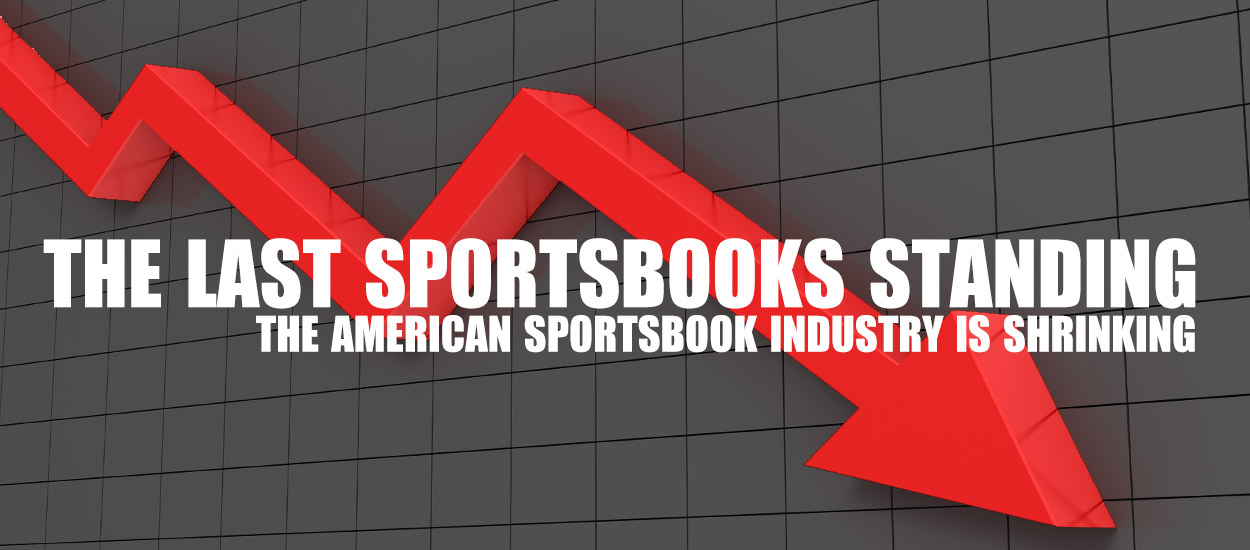Sportsbooks in the U.S. continue to leave the market
A colleague of mine who lives in Arizona and writes handicapping articles for a local newspaper sent me a text which read, "there goes another one." I was a bit confused until he shared an email from BetFred saying they were no longer taking deposits from Arizona residents, with plans to exit the state shortly. BetFred is licensed in just six states now with their exit from Arizona and Maryland, but they acknowledged that a full pullout from the U.S. market is possible, since there is just no path to profitability in the United States.
In the last fiscal year BetFred lost almost $100 million USD, almost exclusively due to the failed U.S. launch, but they are still doing well in the rest of the world. And make no mistake, BetFred is hardly a small book. The company, founded in the UK in 1967, had turnover of almost $1.2 billion USD in 2023 for its worldwide operations, a 26% increase from the prior year and outside of the U.S., their profits are quite good.
Early 2024 predictions
Near the beginning of 2024 I wrote an article asking what the likelihood is that the smaller sportsbooks will be in operation by 2026 - "What are the realistic hopes for smaller sportsbooks in North America?" It appears I may have been optimistic.
The article was written after Unibet pulled out of the U.S. market and PointsBet sold their U.S. operations to Fanatics. But since that article was written, BetFred, who I gave an 8/10 to still be around in 2026, looks set to leave the market, while SuperBook, which I gave a 5 out of 10 chance to still be operating, closed shop in July everywhere but Nevada and in that same month, Betway, which I gave a 3 out of 10 chance to succeed, closed up completely in North America. The only company I gave a 10 out of 10 chance to continue was Bet365 and even they may not be safe in the United States, since their latest fiscal year results were almost identical to BetFred and despite a huge increase in turnover, the company posted a near $100 million USD loss, mostly due to the situation stateside. One major difference between BetFred and Bet365 is that BetFred has a huge retail presence with sports betting shops (i.e. land based sports betting) operating throughout the UK and they also run the UK horse racing tote. For Bet365, on the other hand, they are completely online.
The only company I gave a 10 out of 10 chance to continue was Bet365 and even they may not be safe in the United States, since their latest fiscal year results were almost identical to BetFred and despite a huge increase in turnover, the company posted a near $100 million USD loss, mostly due to the situation stateside. One major difference between BetFred and Bet365 is that BetFred has a huge retail presence with sports betting shops (i.e. land based sports betting) operating throughout the UK and they also run the UK horse racing tote. For Bet365, on the other hand, they are completely online.
Looking at other books I mentioned in that earlier article, Tipico, which I gave a 7 out of 10 chance of surviving, sold its U.S. sportsbook operations to MGM, which they run under the LeoVegas brand, and it appeared BetRivers, which I gave an 8 out of 10 chance was going to be bought out earlier this year by DraftKings, but the owners of BetRivers backed out when they didn’t get the offer they wanted. That said, there is no question that BetRivers is still considering their options since profitability at this point is a pipe dream.
Rush Street Gaming, which owns the Rivers brand makes much of its revenues from five land-based casinos in Illinois, Virginia, New York State and two in Pennsylvania. The land-based casinos by all accounts are doing well, but BetRivers is not profitable despite an increase in turnover year-after-year. Almost certainly, Rush Street would love to keep the physical casinos and sell the online BetRivers brand, but DraftKings likely sees the ability to offer retail sportsbooks in Pennsylvania, Illinois and upper state New York the major selling point, which is why they are seemingly so interested in Rivers, which means that Rush Street would have to include it all. Either way what was offered clearly wasn’t enough to finalize the sale, at least today.
As for the other books mentioned in the article, most are so small that they are only still operating because people bet on them by word of mouth or prior association and they spend virtually nothing on advertising or promotions, plus some books like Betly are focusing almost exclusively on casino betting where it’s legal and just offer sports betting as a necessary evil.  The one major exception in the list of books is Hard Rock, which I only gave a 6 out of 10 chance of survival.
The one major exception in the list of books is Hard Rock, which I only gave a 6 out of 10 chance of survival.
Owned by the Seminole Tribe, Hard Rock isn’t going anywhere and just recently expanded to Illinois. The viability of Hard Rock wrested with the court’s decision in Florida over whether their compact with Governor Ron DeSantis could go ahead, and, after the Supreme Court ruled that the compact was valid and the court all but shut down any further options for appeal from Magic City Casino and Bonita Springs (both backed in their lawsuit by DraftKings and FanDuel), Hard Rock’s path to profitability is assured. That said, there have been some rumors kicking around that both DraftKings and FanDuel are looking at a way to partner with Hard Rock to get access to the lucrative Florida market, but at this time it doesn’t seem that the Seminoles have any interest in a partnership.
EU vs US operations
I asked a former manager of an offshore book that catered to both Europe and the U.S. why he feels European books are finding it so difficult to make it work in the U.S. This was his reply:
“I think the big issue for European books, other than Flutter, is that every state in the U.S. has different rules, different tax schemes, and different products they authorize, which makes operating in the country confusing and frustrating. European companies are used to having their business model work in any country they operate, even if the tax requirements are different, but in the United States it’s a mishmash. All one needs to do is look at New Jersey and New York. New Jersey has a fairly low tax rate, allows casino gambling in addition to sports betting, but for a European company to get access to that market they have to partner with a racetrack or Atlantic City casino. And all those casinos already have online partners. So, getting into that state is tough. New York limits the number of companies that can operate, only allows sports betting and charges obscene taxes. Then you go to Illinois or Arizona and it’s a completely different set of rules and Illinois changed their tax system mid-stream.
It’s immensely frustrating and to make matters worse, the market is pretty much controlled by three operators right now so you are made to jump through hoops and change your whole business model in the hopes of being able to scoop up the few scraps left behind by DraftKings, FanDuel and MGM. Even then there is no guarantee you can be profitable unless you pour money into advertising, but that is expensive, plus you are limited on what type of advertising you can do and when and where it can be shown. It’s an absolute mess.
To make matters worse, many of these companies, like Unibet, went in with good intentions, tried to follow the rules, but for their efforts were hit with huge fines for violations that were not clear and to my eye at least were questionable at best. And there is really no place in the states to appeal your case. Also, geolocation is a mess. You can have 3 states that can all get the same Wi-Fi signal yet one state offers only sports betting, one offers casinos as well and one offers only land-based betting. Yet if somehow a bettor from a state with only sports betting is able to access the same product (say DraftKings) of a state with casino, then you can get fined. And to make things worse, a lot of UK books make most of their money from horse racing, but it’s off limits in the U.S., since all betting on horse racing must be pari-mutuel. It is ridiculous and I don’t blame many of these European books throwing up their hands and saying enough is enough. Our company obviously never had a legal U.S. gaming license (since I left the industry before 2017), but if I was still involved and looking to expand the operation, it wouldn’t be in the United States. There’s just no real opportunity to make money there and like with any decision in life you have to ask how much b.s. you’re willing to put up with before you decide that pursuing the objective just isn’t worth the headaches, financial outlay and confusion.”
Another operator, who was a general manager for one of the biggest offshore companies, said in his opinion it was simply a matter of not wanting to run out of funds before profitability:
"To be honest, I don’t think that anything has really changed since the various markets first opened with operators in a cutthroat battle to build scale, prioritizing growth over profitability. I imagine they all took a conscious decision to accept operating at a loss in the short to medium term, but there still appears to be no end in site for the geographically restricted, small to medium sized operators. At least your FanDuels and DraftKings are able to benefit from some economies of scale and network effects with their marketing across state lines that just don’t exist for the BetFreds and Unibets of this world.
The European operators have shareholders to answer to and are for the most part self financed and have not benefitted from significant funding from off market VCs who are willing to forego short-term profits for potential long-term market dominance. The high burn rates in U.S. markets hurts their share price and makes shareholders uneasy.
Also, none of them had first mover advantage and certainly did not have access to the player bases that the larger fantasy sports sites possessed before other competitors can gain a foothold as well as the local knowledge that comes with that.
I don’t think it is a Euro vs US strategies (issue) per se but rather it is as simple as companies deciding that the land grab strategy is no longer worth the risk of running out of funds before achieving profitability and there is a distinct possibility that the market may not develop as they originally anticipated."
Canada sees more stability
It should be noted that the aggravation from European books applies exclusively to the United States and not Ontario. Bet365 was just passed by FanDuel as the biggest company in the province for turnover but in terms of profitability it appears Bet365 is doing better. And, despite the crazy number of operators in the Ontario market, it seems most are doing ok.  That may be a bit surprising after Coolbet left almost immediately and Mansion casinos followed suit, but since then there have been no defections. I spoke to an analyst in Toronto who said that there is enough revenue from sports betting and casinos in Ontario to keep all operators afloat and even some of the local companies like Bet99, Northstar Bet and Sports Interaction have their share of loyal customers, which keeps them happy. They also still offer their product to other provinces without having to compete with the likes of DraftKings or BetMGM who won’t operate in grey markets, despite the fact that Ontario isn’t concerned where those companies operate, as long as they are licensed in Ontario and following iGaming rules when they cater to the Ontario market. In better words, Ontario doesn’t have a bad actor clause but many of the big operators still choose to operate only in Ontario, since Ontario is clearly a licensed and regulated jurisdiction.
That may be a bit surprising after Coolbet left almost immediately and Mansion casinos followed suit, but since then there have been no defections. I spoke to an analyst in Toronto who said that there is enough revenue from sports betting and casinos in Ontario to keep all operators afloat and even some of the local companies like Bet99, Northstar Bet and Sports Interaction have their share of loyal customers, which keeps them happy. They also still offer their product to other provinces without having to compete with the likes of DraftKings or BetMGM who won’t operate in grey markets, despite the fact that Ontario isn’t concerned where those companies operate, as long as they are licensed in Ontario and following iGaming rules when they cater to the Ontario market. In better words, Ontario doesn’t have a bad actor clause but many of the big operators still choose to operate only in Ontario, since Ontario is clearly a licensed and regulated jurisdiction.
There is talk that Alberta will likely open its market in 2025 and if that happens other provinces will eventually follow suit. Should that occur, Canada becomes much more appealing to all books, both large and small alike. But one comment that Scott Vanderwel from PointsBet and some other Canadian sportsbook operators mentioned at the Canadian Gaming Summit earlier this year, when asked what they would say if Canada opens up its market was "don’t be like the United States and have a different set of rules for each province as it’s a recipe for disaster."
So, where does that leave the current situation? I spoke with a couple of analysts and they were in consensus that in the United States these will likely be the only sportsbooks still operating within 5 years – DraftKings, FanDuel, BetMGM, Caesars, Fanatics, ESPNBet and Hard Rock. Plus, these experts feel that there could still be mergers among them, especially with BetCaesars, which is not performing to its expectations online. So, like Wynn, they may want to just focus on land-based casinos. If that’s the case, Caesars probably won’t just fold, but will sell or merge with a company like MGM. If that does indeed happen, and any of the other companies partner up, then it is conceivable that the number of legal online sportsbooks for the United States could be counted on one hand. Of course, that could change if states like New York or Pennsylvania lower their tax rate and there could also be a renewed interest by some European companies if the U.S. offers casino wagering in more states, allows sportsbooks to create horse racing lines outside of the tote, and/or if the states create new laws which gives some incentive to operate there. But as long as there is no path to profitability, it’s doubtful any new companies will be looking to set up in the U.S. any time soon.
Read insights from Hartley Henderson every week here at OSGA and check out Hartley's RUMOR MILL!







































